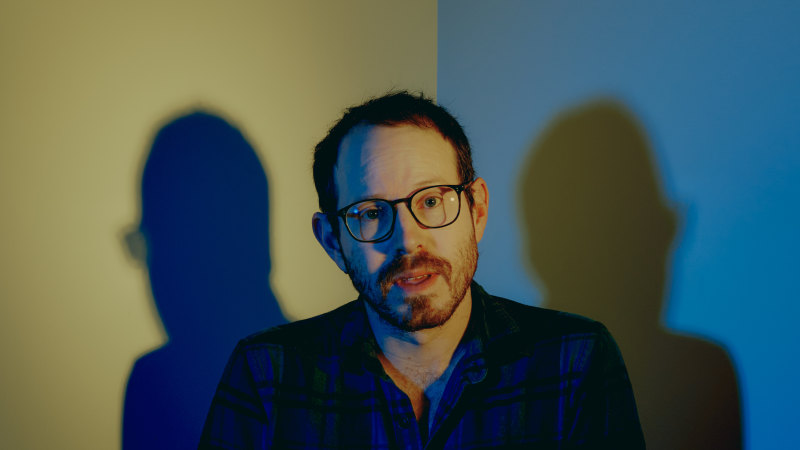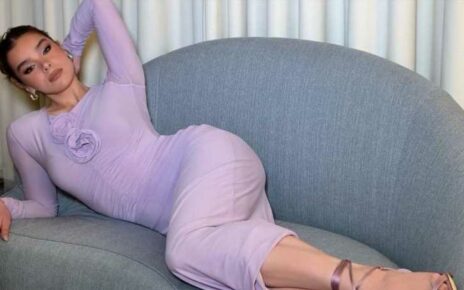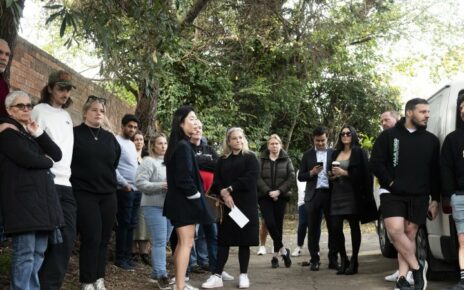By Karl Quinn
Joaquin Phoenix as the titular character in Ari Aster’s Beau Is Afraid.Credit:Takashi Saeda/Roadshow
Save articles for later
Add articles to your saved list and come back to them any time.
Ari Aster really wants you to watch his new movie, Beau Is Afraid. “It’s the biggest film I’ve made, which means more money went into it, which means it needs to make more money,” says the writer-director of genre-busting horror hits Hereditary and Midsommar.
“I hope it’s successful so I can continue to make films on a scale similar to this, but also because I’m proud of it. And because I love the film, I hope people see it.”
But as much as he wants the movie to connect with people, he really really doesn’t want to talk about it. At all.
“Anything I tell you, I’m gonna regret saying,” he says over a Zoom call that is punctuated by the longest pauses I have ever experienced in decades of interviewing artists of all persuasions. “The best viewing experience would be without the baggage of having seen anything, or heard anything, and be able to just take it all in for the first time.”
Well, given there are posters out there, and a trailer, that’s not going to happen. So, what’s your fallback position?
Ari Aster in Manhattan, March 2023.Credit:Victor Llorente
“The second most ideal viewing experience would be to not read an interview with me,” he says. “But if you have, unfortunately, seen a trailer, or a poster, or read an interview, then where does that leave us? Hopefully just, I don’t know, open-minded. I don’t know. That’s hard to answer because…”
A long pause follows.
Aster’s film is three hours long, and it’s unlike pretty much anything you’ve ever seen before. As the titular Beau, Joaquin Phoenix is in almost every shot, apart from a couple of sequences that show this anxiety-riddled character as a boy (played by Armen Nahapetian) on the cusp of puberty, and the terror that will soon engulf him, for reasons that eventually become (more or less) clear.
Over the course of those three hours, our befuddled hero stumbles from one nightmare scenario to another.
We first meet the adult Beau on the street outside his rundown apartment block, running the gauntlet of hyper-violence, pure terror in his eyes. Junkies lie dead in the gutter, a naked man stabs strangers with a knife, a tattooed psychopath chases him as he races desperately towards the security door of his building. From there, things go rapidly downhill.
There are times when Beau’s journey takes on a cartoonish quality.Credit:Roadshow
But is any of it real? Or are we meant, rather, to be experiencing the world the way Beau does, through a prism of fear and mental illness that distorts what is “really” there?
“I wouldn’t say it’s necessarily … I mean, yes, sure,” says Aster when I ask if his aim was to place us inside Beau’s subjective consciousness.
He rubs his head, stares at the ceiling, and eventually switches his focus back to the screen. “Yeah,” he says, after another long pause. “I’m not sure how much to add to it. But yeah.”
Well, let’s try it this way: is the heightened sense of danger in the film a projection of your authorial voice, or is it meant to be a representation of Beau’s experience of the world?
“I would say the former, in that this is the world of the film and Beau lives in that world,” he says. “But we are also very close to Beau and his experience.
Phoenix plays Beau at different stages of his life.Credit:Roadshow
“I’m not trying to be difficult,” he adds, pausing yet again. “But, yeah, it should feel like you’re in his experience. It should feel like you are with him, feeling what he’s feeling. That should be the experience of the film.”
He may be an insanely (though amusingly) frustrating interview subject, but over the space of just three features Aster has emerged as one of the most exciting and distinctive new voices in American cinema. Hereditary mashed a portrait of a grieving family with the tropes of devils and witches to push the horror genre into startling new spaces. Midsommar melded a fish-out-of-water story with folklore and folk horror and psychedelia and turned it all into something entirely unexpected.
Both were anchored not just by Aster’s stunning visuals and startling plot twists, but by a riveting central performance, from Toni Collette in the first film and Florence Pugh in the second.
In Beau Is Afraid, Joaquin Phoenix is the pillar around which the frequently absurdist action is built. And Aster insists he was much more than a leading man.
“I cannot imagine what the film would be without him,” he says. “The film grew a lot from what was in my head once he came onboard. That was the best experience I’ve ever had working with anybody.”
In what ways did Phoenix help it grow?
Collaborators: Star Joaquin Phoenix and writer-director Ari Aster on the set of Beau Is Afraid.Credit:Roadshow
“He investigates everything, and he’ll challenge everything, to the point where whatever it was [on paper] almost needs to be, at least momentarily, shirked aside, in order to see if there’s anything else that hasn’t been considered. He’s about as engaged with the material as I can imagine an actor being.”
But it’s your film, your screenplay. Doesn’t that create some kind of conflict?
“No, because we’re trying to get closer to the heart of what it is that I wrote.
“I brought on Joaquin because I knew he had a remarkable talent and a remarkable intelligence,” he continues, “and it would be very stupid to try to rein that in and impose too much on that. I never felt that the work I wrote, or the film I was trying to make, was being in any way sabotaged. It was always the opposite. I felt we were both on the same mission the whole way through, which was, ‘how do we make this as good and interesting and alive as possible?’ It felt like a partnership, very much.”
Armen Nahapetian and Zoe Lister-Jones as the younger Beau and Mona. The mother-son relationship is at the heart of the film.Credit:Roadshow
Aster has described his film as a “hellish Freudian picaresque”. In its simplest terms, it’s about a man crippled by anxiety trying to visit his mother, Mona (played by Patti LuPone and, in her younger incarnation, by Zoe Lister-Jones), only to find his journey endlessly and catastrophically disrupted.
But it deploys some of the central ideas of psychoanalysis, as both literal and metaphorical devices. The very first scene has the baby Beau emerging from his mother’s birth canal, and in a sense the entire movie is about his attempt to get back there, to the last place he felt truly safe and at home.
It is, in other words, the primal Freudian psychodrama, a story about the pain of separation, and the damage done by a mother to a son.
So, I ask him, how do you think female viewers and critics are going to react?
“What do you think I should be expecting?”
I don’t know, but a backlash wouldn’t seem too far out of the question.
“Yeah, I wonder. I wonder if some of them will almost find it funny, or will almost find themselves even relating to Mona. Who knows? I don’t know. But it’s all sort of like a Freudian joke, right.”
Immediately, he wishes he could take those words back. “I wish I didn’t say it,” he says. “I’m being more reductive than I want to be. Even to say that feels too obvious.”
He will, at least, readily admit to being a fan of the talking cure (just not where his own work is concerned, apparently). “I’ve probably spent, you know, eight cumulative years in therapy, and I really believe in it. I think therapy is great.”
If Aster is at pains to avoid saying much about his film because he wants people to experience it in a pure unmediated form – which, to be fair, is a perfectly reasonable desire, if rather at odds with the whole point of a publicity campaign – he will at least offer one note on tone.
“It’s a comedy,” he says. “I wanted to make a film about ambivalence, and about how daunting it is to be alive and to be in the world. And I wanted to do it on a big carnival canvas.”
But, of course, there’s a caveat.
“I hope it is kind of tricky to put into a box. I wanted to make something that was sad and funny, and I guess I was in a playful mood while I was writing it. And it was a joy to make, because it felt kind of untethered to much of anything, you know. So there was a freedom in making it that was very, very nice.”
He actually started on the story a decade ago, before he’d made a feature. Then came Hereditary and Midsommar, and suddenly, he was one of the hottest young talents in the indie world. And then along came A24 with the backing to finally make his crazy vision a reality.
Though they messed with the form, the other two movies were genre pieces. Beau defies categorisation. Does that mean it says more about you than the earlier works?
“I think my friends would say, and have said, that this film feels more like me than the others,” he says. “I think more of my humour is in the DNA of the film.”
Nathan Lane and Amy Ryan play a couple who take Beau in after he is hit by a car. Credit:Roadshow
Is it in any way, dare I ask, autobiographical?
“No, there’s nothing autobiographical in Beau Is Afraid. It’s a personal film, but there’s no autobiography. It’s personal in the way that any film is personal, especially if the person who directed it also wrote it, right. But no, there’s no autobiography there. I connect to Beau, I love him.”
Do you? Do you not want to just shake him and say, come on Beau, just snap out of it?
“Yeah,” he says, allowing himself a wry smile. “I want to shake myself too, and tell me to snap out of it. I wish I could.”
Beau Is Afraid is in cinemas nationally from April 20.
Find more of the author’s work here. Email him at [email protected], or follow him on Facebook at karlquinnjournalist and on Twitter @karlkwin.
Find out the next TV, streaming series and movies to add to your must-sees. Get The Watchlist delivered every Thursday.
Most Viewed in Culture
Source: Read Full Article









